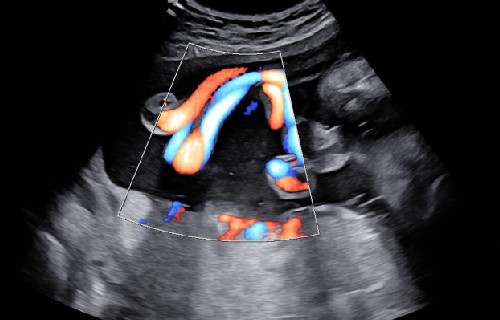
Dr Gerard Albaigés, head of R&D at the Foetal Medicine Division of the Obstetrics Unit of Dexeus Mujer is part of the team of researchers participating in the prospective, multicentre study TRUFFLE 2 (Trial of Randomised Umbilical and Foetal Flow in Europe). The aim of this study is to address monitoring and optimal thresholds for delivery in late-onset foetal growth restriction, from 32-36 weeks of pregnancy. This study builds on the work of the team that implemented TRUFFLE 1 between 2005 and 2010.
Until the TRUFFLE study, the optimal time to deliver growth-restricted foetuses depended on the experience of the individual clinician and/or institution. The clinician considered and weighed the risks of stillbirth, obstetric intervention, prematurity, neonatal death, and long-term neurodevelopmental impairment. The study sought to determine whether an optimal monitoring modality and delivery threshold could be established.
To date, no intervention other than delivery has been reported to have an impact on late-onset foetal growth restriction. However, increasing the prevalence of preterm births through intervention in pregnancies considered to be at risk is associated with increased morbidity for the mother (due to caesarean section, induction of labour) and her baby (increased risk of poor birth outcomes and the consequences of neonatal admissions), and even with a small but significant increase in the risk of the child having special needs at school.
TRUFFLE 2 involves leading perinatal centres in the UK, Europe, and Scandinavia, with excellent foetal, obstetric, and neonatal medicine services. This group now has over 30 members committed to prospective research in high-risk perinatology and foetal growth restriction. Dexeus Mujer is currently the only centre in Spain that participates in this study.
More information:
DEXEUS CAMPUS
Gran Vía de Carles III 71-75
08028 Barcelona
campus@dexeus.com
(+34) 93 227 47 09
® Copyright 2021-2025 Dexeus Mujer Foundation – Gran Via Carles III 71-75. 08028 Barcelona. Spain
| Cookie | Duration | Description |
|---|---|---|
| cookielawinfo-checkbox-analytics | This cookie is set by the GDPR cookie consent plugin. The cookie is used to store the user's consent for cookies in the "Analytics" category. | |
| cookielawinfo-checkbox-functional | The cookie is set by the GDPR cookie consent to record user consent for cookies in the "Functional" category. | |
| cookielawinfo-checkbox-necessary | This cookie is set by the GDPR cookie consent plugin. Cookies are used to store the user's consent for cookies in the "Necessary" category. | |
| cookielawinfo-checkbox-others | This cookie is used by the GDPR component. It is used to store the user consenting cookies in the "Other" category. | |
| cookielawinfo-checkbox-performance | This cookie is set by the GDPR cookie consent plugin. The cookie is used to store the user's consent for cookies in the "Performance" category. | |
| elementor | ||
| viewed_cookie_policy | The cookie is set by the GDPR cookie consent plugin and is used to store whether or not the user has consented to the use of cookies. It does not store any personal data. |
| Cookie | Duration | Description |
|---|---|---|
| _icl_visitor_lang_js | To allow multi-language functionality for web content. | |
| wpml_browser_redirect_test | Used to verify if cookies are allowed in the browser. |
| Cookie | Duration | Description |
|---|---|---|
| _ga | The _ga cookie, installed by Google Analytics, calculates visitor, session and campaign data and also tracks site usage for the site's analytics report. The cookie stores information anonymously and assigns a randomly generated number to recognize unique visitors. The _ga cookie, installed by Google Analytics, calculates visitor, session and campaign data and also tracks site usage for the site's analytics report. The cookie stores information anonymously and assigns a randomly generated number to recognize unique visitors. | |
| _ga_1WD9MFDMJK | This cookie is installed by Google Analytics. |
| Cookie | Duration | Description |
|---|---|---|
| wp-wpml_current_language | Necessary for the operation of the website in the different languages |